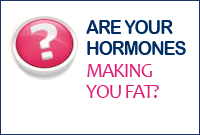PCOS caused by hormonal imbalances
Understanding Hormones and Diet
By far the biggest lifestyle contributor of hormonal imbalances leading to PCOS is poor diet and a natural weight loss program designed for PCOS is a must.
Research supports that a diet consisting of a high consumption of sugar,refined carbohydrates, food chemicals, obesogens, synthetic estrogens and food preservatives causes an unhealthy imbalance in hormones associated with PCOS.
PCOS Diet and Insulin - Dietary Changes To Balance Insulin
If your diet cinsists of stimulants, refined foods and other insulin producing products, then the excess insulin will stimulate androgen receptors on the outside of the ovary, causing the typical PCOS symptoms of excess hair (on the face, arms, legs), thin hair (on the head), and acne. Eventually this type of diet will cause obesity, which will cause insulin resistance (the inability of the cells to take in insulin) which will aggravate the PCOS even more.
Insulin resistance and excessive insulin production appears to cause the overproduction of androgens associated with PCOS.
Insulin transports sugar (in the form of glucose) out of the blood and into muscle, fat, and liver cells, where it is converted into energy or stored as fat. Women with PCOS produce excess insulin, because their cells are "resistant" to insulin. The body compensates by producing more insulin. Resistance means that the process of removing sugar from the blood and into the cells is defective and the cells do not respond to insulin. The pancreas senses high levels of glucose and continues secreting insulin to remove sugar from the blood and into the cells.
High levels of insulin can predispose a woman, directly or indirectly, to polycystic ovaries, and an increased risk of metabolic syndrome, insulin resistance and heart disease.
Insulin resistance appears to lead to high levels of androgens, resulting in menstrual irregularities and other symptoms typical of PCOS. Implementing a weight loss program specifically designed for PCOS can reverse this influence.
PCOS Diet and Oestrogen - So How Does Oestrogen Affect my PCOS?
Oestrogen Dominance or high levels of estrogens caused by environmental toxins is associated with PCOS and can cause cravings - especially before your period which lead to weight gain.
Oestrogen dominance is associated with other hormonal imbalances that sabotage weight loss such as:
Oestrogen causes insulin resistance, which results in impaired glucose tolerance or a rise in glucose levels, as it's not entering the cells where it's needed. This has a direct affect upon your metabolism and sabotages your weight loss. A targeted weight loss program for PCOS is a great place to start in balancing excess oestrogen levels.
PCOS Diet and Genes - Your Genes and Weight Gain with PCOS
Research has found that polycystic ovary syndrome is at least partly caused by the set of genes called "thrifty" genes. These genes mean you store calories easier.
PCOS Diet and Biochemical Signaling Disorder
In addition to numerous hormones such as insulin, there are dozens of other signaling proteins in your tissues and blood that communicate information to your cells. A number of studies have shown that the complex interplay of signaling proteins in PCOS is disrupted causing weight gain.
PCOS Diet and Leptin - How does Leptin cause weight gain with PCOS?
Leptin, is a hormone produced by your fat cells and women with PCOS are prone to low leptin levels. It's involved in weight and appetite regulation. Leptin signals your brain when fat cells are full. This means that low levels of leptin can result in food cravings and cause weight gain.
PCOS Diet and Ghrelin - How does Ghrelin cause weight gain with PCOS?
Women with PCOS are prone to elevated ghrelin levels. Ghrelin is a "hunger hormone" and regulates how much food you eat, and feelings of hunger - directly influencing your weight.
PCOS Diet and Cholecystokinin - How Does Cholecystokinin (CCK) Cause Weight Gain With PCOS?
Women with PCOS have reduced Cholecystokinin (CCK) levels. CCK is a hormone released in the gastrointestinal tract when you eat a meal that slows down the digestive process and provides "Satiety" - Impaired CCK secretion causes greater frequency of binge eating.
PCOS Diet and Glandular weakness eg Hypothyroidism
Thyroid imbalance and PCOS go hand in hand resulting in a lower metabolic rate and difficulty in losing weight.
Hypothyroidism (underactive thyroid) can lead to a reduction of sex hormone binding globulin and an increase in free testosterone - one of the contributing factors to PCOS.
|
For More Information on how the MassAttack Program works Click Here |
top of page |

